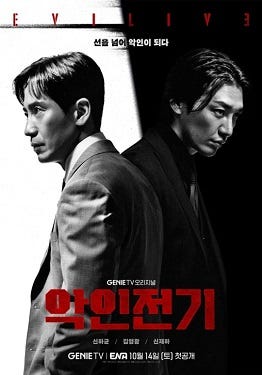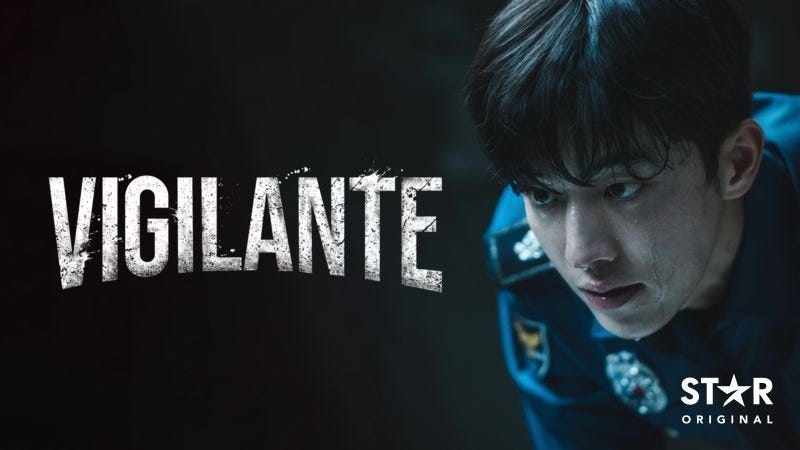By almost every objective metric, The Heart should have been one of the year’s best dramas. In truth it is the best medical drama I’ve seen so far coming out of the mainland. (Although I haven’t seen that many good ones truth be told) The script is meticulous, well-researched and the character arcs are brilliantly woven into the story. But tackling all 38 episodes is likely to be a marathon for many especially in the home stretch. It could have been China’s answer to Hospital Playlist but sadly lacks the latter’s impulse for economy as it inevitably gets bogged down by romances that it arguably doesn’t need. It’s a shame really because the series has a plenty of heart and the relationship among the three leads is one of the show’s bright spots. Moreover the patient stories and their unveiling within the show’s larger tapestry are among some of the best I’ve ever seen.
Mark Chao, Jin Shijia, Rachel Mao Xiaotong are the aforementioned leads in this slice-of-life drama a cardiology specialist centre as its backdrop. Mark Chao is Zhou Xiaofeng, a mild-mannered cardiology internist, Jin Shijia (from Under the Skin) is a cardiac surgeon Lin Yi and Rachel Mao plays Fang Xiaoran, an ICU doctor with surgical training. Xiaofeng and Lin Yi are polar opposites in temperament. Lin Yi though a talented surgeon is something of a loose canon and tends to run his mouth. Xiaofeng is a capable administrator but defers a little too much to his ethically challenged mentor. Xiaoran, on the other hand has the best bedside manner of the trio. Unknown to most of their colleagues, Xiaofeng and Xiaoran are half siblings. Their mother is a famous cardiologist Fang Zhuqing who divorced Xiaofeng’s dad when he was a boy. Mother and son are estranged from one another and part of Xiaofeng’s journey is to gradually reconcile with her.
As with all good camaraderie that is forged through fire, opposites clash at first but it doesn’t take long for them to appreciate the other’s skill set and even become a dynamic duo for more complex, multi-stage procedures. Lin Yi’s life is further complicated by the fact that he’s also the primary caregiver of an older brother who is living out the final stages of a genetic heart disease that could also afflict him at any time. It’s the sword that hangs over his head. There’s no cure for the condition but it is that which animates his embrace of medicine and his attitude towards patient needs.
A major chunk of the show is about the inner workings of the cardiology unit from the administrative side of things to inpatient consultations. It peels away the perceived glamour of the profession by featuring plausible predicaments related to short-term and long-term patients who wander around the hallowed corridors of the hospital. Right from the word “go”, it’s clear that the demand for medical services outstrip the supply. Medical staff with all their own personal baggage are overworked to the bone. Yet they are still expected to perform 110% once they put on the uniform. In that light, the drama highlights not only the limitations of medical science as it currently stands but also the enormous responsibility of clinical practice at every level. From inpatient visits to pre-surgery consults and post-operative recovery in the ICU.
In addition cardiac medicine also serves as a recurring metaphor and vehicle for a larger conversation about the importance of community not just among the medical professionals but the patients who temporarily find their place in that place. Medicine is more than a science. Everyone has a story. Strangers who occupy the same space for a period of time form a bond that have important consequences for the future. Some are pulled from the cusp of death while others never leave. But all leave indelible traces behind providing crucial life lessons.
There’s a part of me that is keen to recommend this. The production values are high. The cinematography is excellent and the casting is generally right on the money. However 38 episodes might be a slog for some and more importantly, there aren’t any good subs that I’m aware of. Still if you’re keen on a good heartwarming thoughtful drama, this could be the thing to hit the spot.
Unless they’ve been living under a rock all this time, anyone over the age of 25 is likely to have heard of Nietzsche’s cautionary line about those who battle monsters and stare into the abyss. It has a habit of popping up in crime K dramas especially the ones with the words “evil” or “darkness” in their titles. Evillive is tragic tale about one man’s gradual descent into the pit of hell itself. It isn’t the love of money necessarily that drives him there although the prospect of more wealth has its attractions. Temptations abound but not everyone succumbs. Simply put, Han Dong-soo is a man exhausted from the existential threat posed by corrupt politicians and psychopathic gangsters. He is tired of doing everything by the book only to find the law working against him. He is intelligent enough to wade through rough seas, diligent in discharging his responsibilities but the weight of supporting a sizeable family falls on him. At the start he believes in doing the right thing. That’s why he, I imagine, studied law with a belief that the system would effectively arbitrate right and wrong. Justice would prevail. Good would triumph over evil. In an ideal world, that would be consistently true but Han Dong-soo becomes a punching bag for a brutal reality where power persistently displaces moral principles. The law offers a veneer of civility and respectability but in the back rooms where dodgy deals are decided, “might is right” is the operational ethos. Whatever restraints the law might provide against the encroachment of evil, it is useless against those who have no respect for the rule of law.
***Spoilers ahead***
On the surface the show would like us to think that Han Dong-soo is a good man who stared too long into the abyss and turned into a monster. External forces are to blame. No one who’s been watching would dispute that he spends too much time hanging around Seo Do-young and is artfully manipulated by the gang leader to the point of no return. But ultimately Dong-soo’s pride is bruised and he lashes back with a vengeance. With all his talk of “friendship” and “partnership” Do-young evidently has no sincere intention of treating Dong-soo as an equal. His veiled threats. Not-so-subtle coercion. All of that demonstrated his desire to dominate, to show who’s in-charge. This ultimately leading to his downfall. He watched Dong-soo’s transformation with a godless glee but he had unleashed a monster that was not content to be a well-behaved house pet. And why would he be? From his point of view, Dong-soo was the brains behind not only one money-making enterprises but two. When he observed that Do-young was raking in the big bucks while he was relegated to being a well-paid minion, frustration kicked in and then festered into resentment. Do-young then offered up the final test: to kill or not to kill.
It’s much easier to dump it all on “society” or the “system” and clearly there’s enough blame to go around for a bit of that. Since however Dong-soo is being contrasted with his younger brother Beom-jae, it’s obvious that he allows his darker impulses to overrule all his moral restraints. He’s no vigilante or cop fighting homicidal maniacs. Indeed it is part vengeance, part ego. His entire trajectory may have started with the need to keep his head above the water but it didn’t end that way. All he needed was the right triggers for his transformation into a unconscionable perpetrator to be complete. No amount of rebuke or cajoling from family would turn him away from that road. It’s a spiritual issue first and foremost. And Han Dong-soo becomes the man that he once despised and fought against.
“What does it profit a man if he gains the whole world and forfeits his soul?” (New Testament)
Speaking of vigilantism, the new offering on Disney+ Vigilante has taken over the spot vacated by The Worst of Evil. On paper and considering the cast, it should have hit all the right notes for me but from its execution it is so far an ideas show with largely one-note meat puppets moving around on a chessboard. It feels like everyone is some kind of crusader or mouth piece for a cause except for the man at the centre of this who is more The Punisher than Daredevil. Of course vigilantism is a symptom of a corrupt degenerate society that condones crime by omission due to its failure to properly mete out punishment. Vigilantism is also a reaction to increasing barbarism and rejection of the rule of law. Nam Joo-hyuk’s vigilante, a young police academy student Ji-yong was a victim of a crime committed against his mother but the copycats who consider him a role model are a different matter. Worse still is the journalist who is egging on the vigilante through a form of “ambulance chasing”. She may or may not care about the victims of crime or be one herself but the result is that she’s using the media platform irresponsibly to sustain a narrative about why vigilantism might be a necessary evil. By naming him as such she gets to start that conversation, hijack his activities as some righteous cause to push forward whatever agenda she has in mind. Ironically, the vigilante’s biggest fan, his copycat has the resources to do far more damage picks up on this and tries to co-opt whatever it is she’s trying to achieve as his cause. Soon all the attention is focused on the vigilante rather than about the victims of crime or even about the shortcomings of the criminal justice system in dishing out convictions.
I’m a huge fan of the Daredevil television series starring Charlie Cox in the titular role because Matt Murdock constantly wrestles with the spiritual ramifications of what he does when he dons the mask. He is quite aware that he’s working outside the law (quite the pickle for a lawyer) but feels compelled to protect his neighbourhood because the law is helpless against corruption because those involved see themselves as above the law. He’s been endowed with special abilities that seems to be a sanction from on high and yet he’s constantly worried about the people around him getting hurt because of him. On a philosophical level, he’s a Christian vigilante. He engages in ontological debates with others and himself. He is undergirded by moral values and perpetually fears crossing “that” line into taking a life. Those in the know are afraid for him in that regard. The K drama vigilante though full of well-intentioned fervour on the part of the main actors comes across as nihilistic because at the end of the day it is about the exertion of power not of the triumph of the rule of law or equality before the law. Nam Joo-hyuk’s vigilante rather than a symbol of justice becomes the product of bandwagoning and agendas.
The end of Episode 4 signals the start of what looks to be a propaganda cat and mouse war. Any kind of crisis fought in the media almost always inevitably become a war of competing narratives no matter the truth.
Thanks for reading. If you enjoyed this post, please like, share, subscribe or leave a comment.




